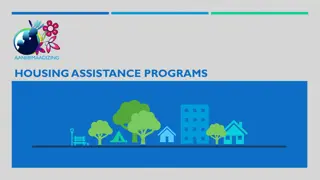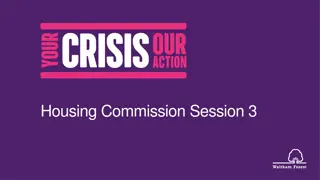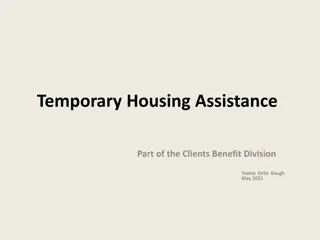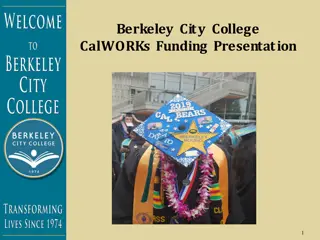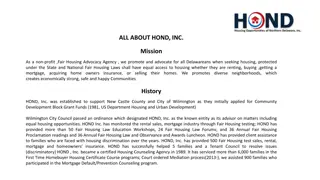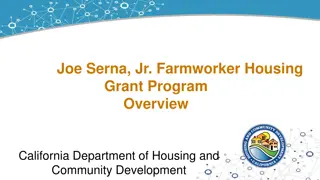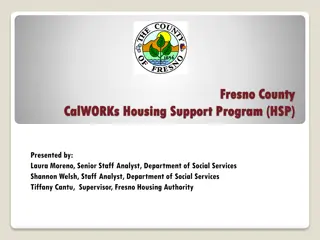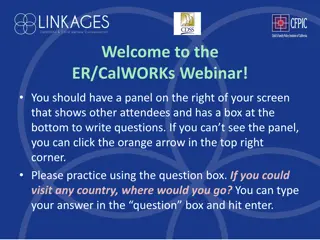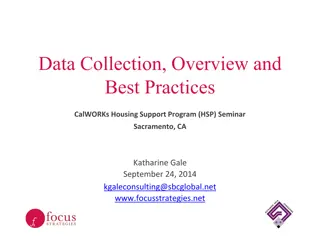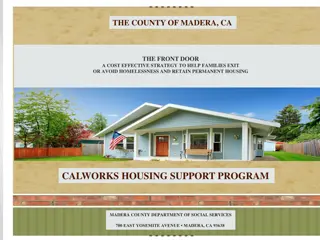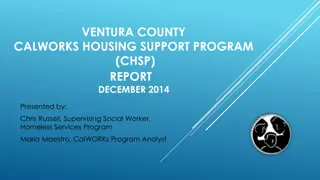CalWORKs Housing Support Program (HSP) Overview
The CalWORKs Housing Support Program (HSP) aims to assist CalWORKs families experiencing homelessness by providing rental assistance and support services. The program facilitates a gradual transition to full rent payment, with a focus on assessing and overcoming barriers to housing stability. Key components include flexible funding, reassessments every three months, and financial assistance for rental subsidies, security deposits, utility payments, and more. Collaboration between families and housing teams is essential for successful housing searches and sustainable tenancies.
Download Presentation

Please find below an Image/Link to download the presentation.
The content on the website is provided AS IS for your information and personal use only. It may not be sold, licensed, or shared on other websites without obtaining consent from the author. Download presentation by click this link. If you encounter any issues during the download, it is possible that the publisher has removed the file from their server.
E N D
Presentation Transcript
1 CALWORKS HOUSING SUPPORT PROGRAM (HSP) FEBRUARY 26, 2015 RAFAELA PEREZ & JASON BLAIR Santa Clara County
Target Population 2 CalWORKs Families who are experiencing homelessness CalWORKs Families Employment Services and Safety Net Families (child-only cases) Employment Services Post-Aid Families
Homelessness Defined 3 Homelessness is defined as: 1. Family lacking fixed and regular nighttime residence: Public or private supervised shelter Public or private place not designed for regular sleeping accommodation 2. Court ordered eviction
Program DesignRapid Re-Housing 4 Goal is to serve between 90 and 105 households Rental Assistance Subsidy household transitions gradually (not suddenly) to full payment of rent Tenant Contribution to rent increases incrementally Subsidy depth is determined at assessment Household is reassessed every 3 months
Program Flow 5 Family Request CalWORKs Employment Services Eligibility Worker Community Partner Housing Services (Abode) to Service to Families Outcomes to County
Rapid Re-Housing-Key Components 6 Move directly from Homelessness to Housing Focus is Housing-assessing/overcoming barriers Focus on increasing income Flexible funding-subsidy depth will vary by household Flexible term-three months to two years Reassessments-every three months
Rapid Re-Housing - Financial Assistance 7 Rental Subsidy Security Deposit Payments Utility Deposit Utility Payment Assistance Moving Costs (e.g. moving company, short term storage) Motel/Hotel/Emergency Housing Housing Search Furniture/Household items
Rapid Re-Housing Housing Search 8 Collaborative efforts between family and housing team Realistic housing choice and vision Mediation and outreach to landlords Assistance understanding leases Making moving arrangements Understanding what it means to be a responsible tenant
Service Coordination 9 Collaborative efforts between family, Family Stabilization staff and Housing Team Housing Team is co-located in the Employment Services Center Developing, securing and coordinating participants services Referrals e.g. financial/credit counseling, legal services Assuring program participants rights are protected
Challenges 10 Increasing household income level Clients expectations Housing Market inventory Term current year allocation vs two year minimum Reporting
Highlights 11 Housing Support Program Homeless Family Stabilization Program Housing Assistance (Prevention) HSP began November 2014 July 2014 to February 2015 90 Referrals/30 Housed 111 families $135,000 $226,000
Marthas Family 12 Martha and her family were living day-to-day in dire straits; bouncing between shelters, motels and, in the most desperate of times, spending the night in her car. The unstable housing situation took its toll on the family and her children frequently missed school. Fortunately, Martha was referred for a Family Stabilization conference where she learned about the Housing Support Program. Within 48-hours of meeting the Housing Team, Martha s family was placed in a 2- bedroom apartment and the program was able to pay the deposit and first month s rent. She also received several housing essentials to for her new place and her boys were excited to get their new beds. The Housing program will continue subsidizing a fair portion of her rent for the first three months. Now that they ve settled in, Dad was able to return to work and Martha has returned to job club and is currently looking for employment. The Family Stabilization and Housing Team will continue to provide services and monitor her family s progress. Once she s back on her feet, Martha is excited about the prospect of being self-sufficient again and paying her rent without the aide of a subsidy. Grateful for the help she received through the CalWORKs Housing Support Program, Martha is now reaching out to other homeless families to let them know that there are programs to help them get back on their feet. Her story was recently featured on the local Spanish TV network Telemundo and she is humbly sharing her experience.
Media Release 13 Ending Homelessness: Countywide Program Is Making Progress Abode Services is helping homeless Santa Clara County families find homes. BySusan C. Schena (Patch Staff)February 2, 2015 at 4:13pm More than a dozen previously homeless families from Santa Clara County are now living in their own homes, and up to 90 more could be transitioning from homelessness to a home in the next six months through a new program administered by Abode Services. The program targets a growing population of homeless families who are struggling to secure employment because of the instability caused by not having a home. While these families are receiving help in training and searching for a new job, their top priority each night is finding a place to sleep. Families are eligible for housing assistance through the new program if they are homeless and enrolled in the California Work Opportunity and Responsibility to Kids (CalWORKs) program. The program includes families who lack a fixed and regular nighttime residence, who are in a shelter or in budget motels, and, among other scenarios, on the streets. Abode Services is using its inventory of affordable housing, relationships with property owners, and more than two decades of experience re- housing people to help these families. The nonprofit is the San Francisco Bay Area s leading provider of services to individuals and families without a home. The housing assistance families receive includes financial aid for housing expenses such as rent assistance, security deposits, utility payments, and moving costs. Abode Services also helps families locate affordable housing units and connects them to other services as needed such as childcare, behavioral health services, and credit counseling and repair services. State legislators approved the creation of the CalWORKs Housing Support Program this fiscal year to address the growing difficulty families with children face in finding affordable places to live. The expansion included a $1.5 million grant to the Santa Clara County Social Service Agency CalWORKs division to help transition families from homelessness into homes.
Media Release 14 Santa Clara County Social Service Agency CalWORKs division selected Abode Services in October to administer the program and the nonprofit began helping Santa Clara County families in November. The need for assistance cannot be overstated. At last count, in 2013, at least 1,067 individuals in families were homeless on a given night in Santa Clara County. In addition, the number of families enrolled in CalWORKs and who utilize homeless services, such as spending a night in a shelter or receiving rental assistance, continues to rise. In FY14, 855 families utilized homeless services while also receiving CalWORKs benefits, a nearly 70 percent increase from 2011. Too many families in Santa Clara County are trying to get by without a home. They re moving from location to location living on couches, in budget motels, and on the streets as they try to find or maintain employment, said Abode Services Executive Director Louis Chicoine. We re glad we can help ease the burden on this vulnerable population by helping to provide stability through a home they can afford and by connecting families to the services that can keep them housed. Abode Services helps families in the program develop housing stability plans that create a framework for them to work towards self- sufficiency. Plans include the family s potential barriers to housing stability and identify ways the family can address those needs. Plans can include referrals to food assistance programs, personal financial planning services, and substance use treatment, employment and CalWORKs services. The plans also identify who in the family is responsible for what action and sets timelines for completion of an action. Abode Services reviews the plans with family members every three months with an expectation that a family works towards contributing more towards housing expenses after each review. The program s goal is to help families become self-sufficient. Continued funding for the program beyond June 30, 2015 requires approval from the state. To learn more about Abode Services, visit www.abodeservices.org


